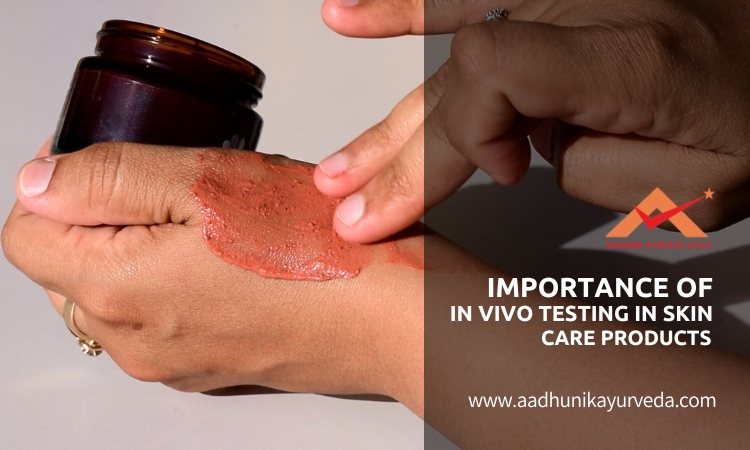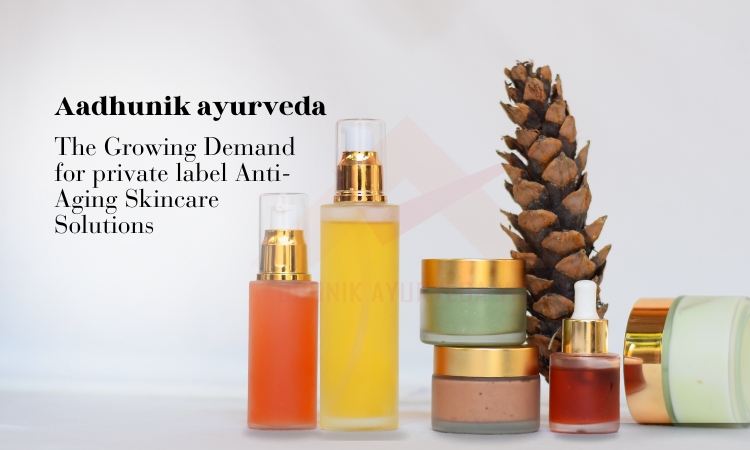
Importance of In Vivo Testing in Skin Care Products
Importance of In Vivo Testing in Skin Care Products | As a skincare manufacturer, the primary goals of in vivo testing are to: | What is In Vivo Testing? | In Vivo vs. In Vitro Testing | Private label skin care product - in vitro vs in vivo | Key Benefits Of In Vivo Testing For Skin Care Manufacturers | Common Skincare Products Tested Using In Vivo MethodsIn the modern skincare industry, where consumers are becoming more aware and selective about the products they use, manufacturers must ensure their formulations meet high safety and efficacy standards. In-vivo testing is a critical process that evaluates skincare products under real-world conditions, providing accurate data on how they interact with human skin.
As a skincare manufacturer, the primary goals of in vivo testing are to:
- Ensure product safety and prevent adverse reactions.
- Validate claims such as "dermatologically tested," "hypoallergenic," and "clinically proven."
- Comply with global regulatory requirements and industry standards.
- Build consumer trust through scientifically backed results.
The significance of in vivo testing cannot be overstated. A product that performs well in laboratory conditions may behave differently when applied to real skin. By conducting in vivo tests, manufacturers can fine-tune their formulations and create products that not only meet but exceed customer expectations.
What is In Vivo Testing?
In vivo testing refers to clinical evaluations performed on human skin to determine a product’s efficacy, safety, and dermatological impact of skincare products. This testing is conducted under controlled environments, ensuring that products undergo rigorous assessments before reaching the market.
In Vivo vs. In Vitro Testing
While in vitro testing is performed in laboratory settings using isolated skin cells or synthetic models, in vivo testing provides direct, real-world data on how a formulation interacts with the skin.
Private label skin care product - in vitro vs in vivo
| Aspect | In Vitro Testing | In Vivo Testing |
|---|---|---|
| Testing Environment | Laboratory | Real human skin (volunteers) |
| Scope | Evaluate cellular reactions | Assess real time product application effects |
| Accuracy | Predicts possible outcomes | Provides direct evidence of product performance |
| Examples | Measurements antioxidant activity in a serum | Checking hydration levels after applying a moisturiser |
Manufacturers use in vivo testing to confirm in vitro findings and ensure that formulations work effectively when applied to human skin. Without in vivo testing, there is a risk of misleading claims, ineffective products, and potential skin irritations.
Key Benefits Of In Vivo Testing For Skin Care Manufacturers
For manufacturers, investing in in vivo testing offers several advantages:
1. Ensuring Product Safety
The primary goal of in vivo testing is to ensure that skincare products are safe for consumer use. By testing formulations on human volunteers, manufacturers can detect potential issues such as:
- Skin irritation and redness
- Allergic reactions
- Comedogenicity (pore-clogging effects)
- Photosensitivity (reactions under UV exposure)
For example, a new vitamin C serum may show promising antioxidant properties in vitro but could cause irritation when applied to sensitive skin. In vivo testing allows manufacturers to adjust concentrations and enhance formulation stability.
2. Validating Claims
Consumers trust scientifically backed claims. In vivo testing helps manufacturers prove assertions such as:
- Provides 24-hour hydration
- Reduces fine lines and wrinkles in 4 weeks
- Non-comedogenic and suitable for acne-prone skin
For instance, if a moisturizer claims to improve hydration for 24 hours, an in vivo test using corneometry (skin hydration measurement) can provide quantifiable evidence supporting this statement.
3. Enhancing Consumer Trust
With increasing awareness about product safety, consumers actively look for dermatologist-tested and clinically approved skincare. In vivo-tested products build brand credibility, reassuring customers that the products are safe and effective.
4. Regulatory Compliance
Many skincare markets, including the FDA, GMP and ISO guidelines which require in vivo testing to validate certain claims. Sunscreens, for example, must undergo SPF validation through in vivo testing before being marketed.
Common Skincare Products Tested Using In Vivo Methods
Various skincare products undergo in vivo testing to confirm their effectiveness and safety. Here are some examples:
1. Anti-Aging Creams & Serums
- Purpose: Reduce wrinkles, improve skin elasticity, and boost collagen production.
- Tests Conducted: Wrinkle depth analysis using 3D imaging technology.
- Example: Retinol-based creams are tested to assess irritation levels and long-term benefits.
2. Moisturizers & Face Oils
- Purpose: Improve skin hydration and barrier function.
- Tests Conducted: Skin hydration measurement using a corneometer.
- Example: A hyaluronic acid moisturizer undergoes 24-hour hydration testing to prove prolonged moisturizing effects.
3. Sunscreens
- Purpose: Protect skin from UV damage.
- Tests Conducted: SPF (Sun Protection Factor) assessment under controlled UV exposure.
- Example: A broad-spectrum sunscreen must pass both UVA and UVB protection tests before regulatory approval.
Research comparing in vivo and in vitro testing of eight sunscreen products shows significant differences in Sun Protection Factor (SPF) results. While in vivo SPF values align with product claims, in vitro tests using UV transmittance analyzers do not reliably correlate with these results, suggesting in vitro methods may be ineffective for accurately assessing sunscreen efficacy.
4. Oil Control & Acne Prevention:
- Purpose: Reduce excess oil, minimize breakouts, and unclog pores.
- Tests Conducted: Sebum level analysis using sebumeters and acne reduction trials.
- Example: Salicylic acid cleansers and niacinamide serums are tested for their oil-controlling and acne-preventing efficacy over a period of weeks.
5. Even Skin Tone & Brightening
- Purpose: Reduce dark spots, hyperpigmentation, and promote a radiant complexion.
- Tests Conducted: Melanin index measurements and before-and-after skin tone analysis.
- Example: Vitamin C serums and alpha arbutin treatments are tested for their ability to fade hyperpigmentation and enhance skin brightness.
How Aadhunik Ayurveda Implements In Vivo testing?
Aadhunik Ayurveda follows strict scientific protocols to ensure the efficacy and safety of every skincare product. Several methods are used to conduct in vivo testing, depending on the product type and claim:
- Patch Testing: Checks for irritation and allergic reactions.
- Clinical Trials: Long-term assessments to measure effectiveness.
- SPF Testing: Evaluates sun protection efficiency.
- Dermatological Assessments: Dermatologists analyze changes in skin texture, tone, and hydration.
- Advanced Testing Equipment: We can cutting-edge instruments like corneometers, spectrophotometers, and 3D skin analyzers.
- Global Compliance: All in vivo tests adhere to international skincare regulatory standards.
Regulatory Compliance and Ethical Considerations
Regulatory bodies set strict guidelines for in vivo testing:
- FDA (USA) – Requires in vivo testing for SPF claims.
- European Commission (EU) – Enforces dermatological testing for hypoallergenic claims.
- ISO 24444 – Sets global standards for sunscreen testing.
Manufacturers must also adhere to ethical guidelines, using volunteer-based testing rather than animal testing, aligning with cruelty-free and sustainable skincare trends.
How In Vivo Testing Enhances Private Label Skincare Manufacturing
For private label skincare brands, in vivo testing ensures:
- Stronger claim validation (backed by scientific evidence).
- Higher consumer confidence (trust in safety and efficacy)
- Market competitiveness (clinically proven products stand out).
- Regulatory approval (meeting global standards for product safety).
Conclusion: Aadhunik Ayurveda – Where Ayurveda Meets Science
As a leading private label manufacturer of Ayurvedic and natural skincare, Aadhunik Ayurveda integrates traditional knowledge with advanced scientific research. Our commitment to in vivo testing ensures that every formulation is not only safe and effective but also meets global regulatory standards. By choosing a manufacturer that prioritizes scientific validation, skincare brands can offer their consumers high-quality, result-driven products with complete confidence.
FAQs:
1. Is In Vivo testing safe for human volunteers?
Yes, In vivo testing is conducted under controlled clinical conditions, ensuring that volunteers do not experience any harm. Ethical guidelines are strictly followed to ensure their safety and well-being.
2. Are all skincare products in vivo?
Not all skincare products undergo in vivo testing, but reputable manufacturers always put the product for in vitro test and thereafter in vivo for product safety, compliance, and efficacy verifications.
3. Does in vivo testing mean a product has zero side effects?
While in vivo testing minimizes risks, individual skin reactions vary. However, it significantly reduces the changes of irritation and allergies.
4. Why should I choose a skincare brand that uses in vivo testing?
Brands that conduct in vivo testing provide scientific proof of efficacy and safety, ensuring that their products deliver real results without causing harm to the skin.
5. Is in vivo testing ethical and cruelty-free?
Yes, in vivo testing is ethical when conducted on human volunteers under controlled clinical conditions. It is different from animal testing, which has been largely banned in many countries. Aadhunik Ayurveda ethical testing protocols that prioritises volunteer safety and consent.
